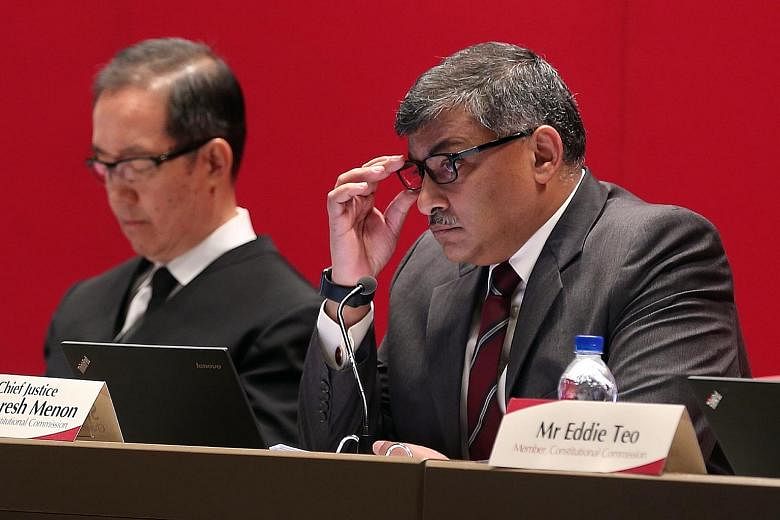These related issues and suggestions were also raised by those who appeared at the first hearing of the Constitutional Commission yesterday:
CHECKS AND BALANCES
Law professor Eugene Tan said adequate checks and balances are important for Singapore particularly in the context of a one-party dominant system.
Acknowledging that the role of the elected president was akin to an "intra-branch check" on the executive branch that is the Government, he said: "Until we have a very secure and stable two-party system at the very least, I think to take away the unique office of the elected president... could mean that we are weakening the safeguards that we have."
But Chief Justice Sundaresh Menon said he was not sure if a one-party dominant system is necessary to explain the need for an elected president. He said that even in a more "balanced political situation", the elected president could play a significant role in keeping that balance.
ROLE OF THE PRESIDENTIAL ELECTIONS COMMITTEE
Prof Tan also suggested that the clause for a candidate's "good character and reputation" be removed from the qualifying criteria as it was a matter best left to the electorate to decide.
Association of Women for Action and Research (Aware) executive director Corinna Lim also said that having a small group - the members of the Presidential Elections Committee (PEC) - decide on who qualifies to contest the presidential election is "problematic". She added that it would also be ideal if the PEC's decisions on candidates be more transparent.
CJ Menon raised the possibilities of expanding the size of the three-man PEC, and strengthening the selection process by having aspiring candidates sign a self-disclosure form.
CJ Menon also raised the possibility that if the issue of character was left to the electorate, there would be a risk of the election becoming divisive and personal - and hence discouraging qualified individuals from coming forward in the first place.
"If we end up making character an electoral issue, squarely putting it front and centre, I have concerns that we'll end up with a system that is more divisive than less," he said.
EDUCATING PUBLIC ON PRESIDENT'S ROLE
Aware's representatives said there is a need to educate the public about the elected presidency because its complex nature may not be fully understood. Said Ms Lim: "It is an elected office but yet it's not something that is so easy to understand ."
Aware's senior manager of programmes and communications Jolene Tan said areas like how the president interacts with the Council of Presidential Advisers (CPA) and the PEC could be explained. Professor Chan Heng Chee acknowledged this was worth thinking about.
TWO-PERSON TICKET
There were suggestions of a two-person presidential ticket in which one candidate would have to be of a minority race.
Law firm intern Brian Chang, 26, said the second candidate could be a co-president or vice-president and serve as chairman of the CPA. He would switch roles with the president after three years, or halfway through a six-year term.
DBS Group Holdings chairman Peter Seah noted that the CPA is an independent body whose independence may be diluted if its chairman ran on the same ticket as the president. Mr Chang acknowledged this but said it will introduce democratic accountability to the council.
Political science academic Loke Hoe Yeong, 31, wanted a similar system. In his version, the vice-president would also be the Speaker of Parliament.
OTHER COUNTRIES
Mr Chang and Mr Loke cited Cyprus, Lebanon, and Bosnia and Herzegovina as countries with systems reserving particular political positions for certain ethnicities. Both said they were not models for Singapore, but were cases that should be studied.
Mr Chang said such approaches ended up giving rise to race-based politics and parties. He added that if there were conditions to ensure a minority member becomes president, it may lead to calls for the same approach to be applied to other key offices such as the prime minister and Speaker of Parliament.
But CJ Menon said the presidency is unique as the president is the "physical embodiment of the state", unlike other officials. Hence, it might merit special consideration that does not apply to other institutions. "This slippery slope argument may be more frightening than it needs to be."
Yeo Sam Jo


